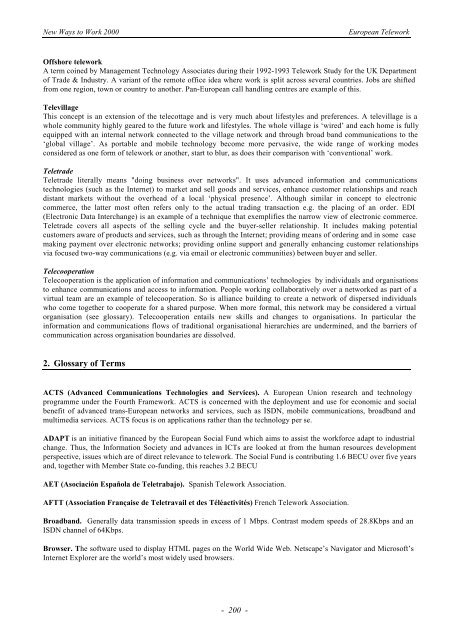eWORK 2000 - European Telework Week
eWORK 2000 - European Telework Week
eWORK 2000 - European Telework Week
- No tags were found...
Create successful ePaper yourself
Turn your PDF publications into a flip-book with our unique Google optimized e-Paper software.
New Ways to Work <strong>2000</strong><strong>European</strong> <strong>Telework</strong>Offshore teleworkA term coined by Management Technology Associates during their 1992-1993 <strong>Telework</strong> Study for the UK Departmentof Trade & Industry. A variant of the remote office idea where work is split across several countries. Jobs are shiftedfrom one region, town or country to another. Pan-<strong>European</strong> call handling centres are example of this.TelevillageThis concept is an extension of the telecottage and is very much about lifestyles and preferences. A televillage is awhole community highly geared to the future work and lifestyles. The whole village is ‘wired’ and each home is fullyequipped with an internal network connected to the village network and through broad band communications to the‘global village’. As portable and mobile technology become more pervasive, the wide range of working modesconsidered as one form of telework or another, start to blur, as does their comparison with ‘conventional’ work.TeletradeTeletrade literally means "doing business over networks". It uses advanced information and communicationstechnologies (such as the Internet) to market and sell goods and services, enhance customer relationships and reachdistant markets without the overhead of a local ‘physical presence’. Although similar in concept to electroniccommerce, the latter most often refers only to the actual trading transaction e.g. the placing of an order. EDI(Electronic Data Interchange) is an example of a technique that exemplifies the narrow view of electronic commerce.Teletrade covers all aspects of the selling cycle and the buyer-seller relationship. It includes making potentialcustomers aware of products and services, such as through the Internet; providing means of ordering and in some casemaking payment over electronic networks; providing online support and generally enhancing customer relationshipsvia focused two-way communications (e.g. via email or electronic communities) between buyer and seller.TelecooperationTelecooperation is the application of information and communications’ technologies by individuals and organisationsto enhance communications and access to information. People working collaboratively over a networked as part of avirtual team are an example of telecooperation. So is alliance building to create a network of dispersed individualswho come together to cooperate for a shared purpose. When more formal, this network may be considered a virtualorganisation (see glossary). Telecooperation entails new skills and changes to organisations. In particular theinformation and communications flows of traditional organisational hierarchies are undermined, and the barriers ofcommunication across organisation boundaries are dissolved.2. Glossary of TermsACTS (Advanced Communications Technologies and Services). A <strong>European</strong> Union research and technologyprogramme under the Fourth Framework. ACTS is concerned with the deployment and use for economic and socialbenefit of advanced trans-<strong>European</strong> networks and services, such as ISDN, mobile communications, broadband andmultimedia services. ACTS focus is on applications rather than the technology per se.ADAPT is an initiative financed by the <strong>European</strong> Social Fund which aims to assist the workforce adapt to industrialchange. Thus, the Information Society and advances in ICTs are looked at from the human resources developmentperspective, issues which are of direct relevance to telework. The Social Fund is contributing 1.6 BECU over five yearsand, together with Member State co-funding, this reaches 3.2 BECUAET (Asociación Española de Teletrabajo). Spanish <strong>Telework</strong> Association.AFTT (Association Française de Teletravail et des Téléactivités) French <strong>Telework</strong> Association.Broadband. Generally data transmission speeds in excess of 1 Mbps. Contrast modem speeds of 28.8Kbps and anISDN channel of 64Kbps.Browser. The software used to display HTML pages on the World Wide Web. Netscape’s Navigator and Microsoft’sInternet Explorer are the world’s most widely used browsers.- 200 -








